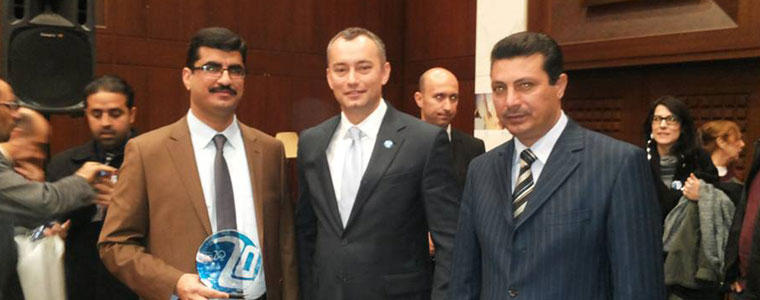An Iraqi civil society leader whose important peacebuilding work has long been supported by the U.S. Institute of Peace (USIP) has received special recognition by the United Nations as a human rights defender in the country.

Abdel Aziz Younis Al-Jarba, 40, heads a nongovernmental organization based in Mosul in Iraq’s Nineveh province. He was among the first Iraqis who, starting in 2004, received USIP training in conflict management and analysis, facilitation, mediation and negotiation—the staples of peacebuilding work in areas torn by conflict. And, more recently, he has helped spearhead a USIP-supported effort to reduce tensions and establish communication and consultation between the Christian and Shebak communities in Nineveh, a province that has experienced a raft of sectarian problems and violence—some at the hands of al-Qaida extremists.
On December 10—International Human Rights Day—Al-Jarba was one of five Iraqis honored in Baghdad by the United Nations Assistance Mission for Iraq and the U.N.’s Office of the High Commission for Human Rights. The Special Representative of the U.N. Secretary-General for Iraq, Nickolay Mladenov, said at the ceremony: “Everyone in Iraq can meaningfully participate in community reconciliation and promotion of justice, in nonviolent and constructive ways.”
Al-Jarba has done more than participate in such reconciliation; he has emerged as a genuine leader whose detailed, persistent work with Christians and Shebaks in Nineveh has won the respect of both communities and almost certainly reduced violence in one of Iraq’s most sensitive and complex settings. His role in mitigating the Christian-Shebak disputes over the past year is one of the reasons cited for his U.N. award.
“His opinion is trusted by political, religious and tribal leaders across the diversity of Iraq,” said Sarhang Hamasaeed, a USIP senior program officer and Iraq expert. “He demonstrates a high level of respect for the people he’s working with, as well as a strain of optimism that is appealing. He uses the language of neutrality in a country and a region where that is very difficult to do.”
Al-Jarba and two other USIP-trained conflict-management facilitators who are members of the Institute-supported Network of Iraqi Facilitators (NIF), Raed Khutab and Saeb Gailani, have led efforts to facilitate Christian-Shebak dialogue. The prospect of violence in some areas of Nineveh increased in recent years as Christians and Shebaks (most of whom are Shiite Muslims) found that important religious activities were overlapping each other on the calendar. In particular, the respective religious calendars had Christmas-related festivities for the Christians partially coinciding with Shiite commemorations of the life and death of a central sacred figure, the Imam Hussein. That has been a particular focus of the Iraqi facilitators again this month as religious activities of the two communities overlap.
Late last year, Al-Jarba received an urgent, late-night phone call asking him to intervene after moves perceived as provocative heightened the risk of immediate violence between the two communities. Driving at night through areas used by al-Qaida militants, Al-Jarba instigated face-to-face contacts with representatives of both sides, with success. “He turned a moment of tension into a moment of understanding,” said Hamasaeed. Al-Jarba, Khutab and Gailani have helped build “a culture of collaboration” between leaders of the two communities, work that is believed to have averted a possible Iraqi military move into the area that would have added new risks of violence.
The peacebuilding campaign of Al-Jarba and his colleagues is all the more important, Hamasaeed said, in light of recurring opportunities to use Christian-Shebak tensions for political gain, a factor that has emerged in the region as some politicians search for support ahead of Iraq’s parliamentary elections in 2014.
Last year, Al-Jarba and others in the NIF also participated in USIP-supported training in Libya and Tunisia. The Iraqis are seen as particularly effective at sharing practical ways of using peacebuilding training in countries like Libya and Tunisia, where revolutions and political tumult have increased the challenges of encouraging nonviolent approaches to conflicts and disputes. Al-Jarba has also been leading a NIF team that is undertaking a conflict analysis of Iraq’s recent upsurge in violence, an effort that seeks to clarify the sources of that violence and suggest nonviolent ways of moving forward through new forms of dialogue.
In addition to training and coaching, USIP supported Al-Jarba and other NIF members to design and execute conflict management and peacebuilding interventions in Iraq, including on sensitive subjects like sectarianism and religion and peacebuilding. These interventions provided the facilitators with opportunities to apply their training and work on disputes and conflicts that are critical to Iraq’s transition.
Al-Jarba’s organization is also a member of a network of nine Iraqi civil society organizations. With USIP grants and training, network members have implemented peacebuilding programs in Baghdad, Diyala, Kirkuk, Nineveh and Salahaddin provinces.
“USIP’s financial and technical support has played an essential role in shaping my skills and capacity to become a civil society activist making an impact,” said Al-Jarba. “Through USIP’s trainings and workshops, I was able to gain the knowledge and the experience that enable me to communicate effectively and build trust with the community, the political parties and the government.”
Added Al-Jarba, “I’m now in a position where my community trusts me and seeks my help when it’s needed.”
Explore further
- A news feature on USIP support for Iraqi minorities
- Sarhang Hamasaeed wrote about the Alliance of Iraqi Minorities
- Iraqi Prime Minister Maliki recently spoke at USIP
- USIP has used grants to strengthen the role of Iraqi youth
- Manal Omar and Hamasaeed look at Iraqi politics and recent violence
- Omar and Hamasaeed on responding to Iraq's turbulence
- An Institute PeaceBrief examines Sunni-Shia relations in Iraq
- An Institute Special Report on mitigating Iraqi media incitement to violence



